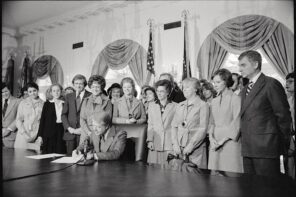Time magazine’s religion top ten list had Mormonism in the spotlight. The Religion Newswriters Association voted Osama bin Laden’s death (and the faith response to it) their number one story in a list that included Harold Camping, Rob Bell, and Mississippi’s Personhood initiative. Oh, and the top religion author of 2011? Tim Tebow, whose life story is a runaway bestseller for our friends at HarperOne.
But what about the stories that shoulda been, but weren’t? We’re thinking this list, drawn up Peter Laarman, might provide a template for 2012 coverage. —The Eds.
1. “Catholic” countries that openly flout Vatican policy
Significant defections from the Vatican party line are no longer limited to rich cosmopolitan countries with religiously mixed populations like Germany and Holland. Nobody does the Vatican’s bidding anymore. Mexico, Italy, Spain, Brazil, and others have enacted legislation that plainly thumbs the Vatican’s nose. In Ireland, where extreme deference to the Church dates all the way back to the Republic’s founding, the prime minister now goes repeatedly before parliament to blister not just a few priests and bishops but Rome itself for massive criminality and concealment. Spain’s prime minister may have gotten the boot in November, but his Socialist government didn’t go down because it had pushed through fast-track divorce and legalized gay marriage: it only went down because of IMF/EuroBank austerity measures.
2. Judaism and Real Estate
No one to my knowledge has written authoritatively in mainstream publications lately on the intensity of internal conversations about the essence of Judaism at a time when more and more Jewish leaders appear willing to follow the ultra-Orthodox in sacralizing the possession of land. There’s an argument going back decades (back at least to Richard Rubenstein’s 1966 After Auschwitz) on the theological/ethical problems relating to land possession. Mainstream media show us the fanatics, of course, but they don’t show us the extent of Jewish unease with land mania.
3. Five-Point Calvinism Inside the Southern Baptist Convention
You’d have to troll through obscure Baptist newsletters in order to see what a big deal this is in the largest U.S. Protestant body: our regular religion writers seem oblivious. While it is certainly true that all traditional Baptists take divine sovereignty seriously, early Baptists in this country decisively rejected the rigid “double predestination” views of the early Puritans who persecuted them. Practically speaking, they were Calvinists only in the sense that Arminius was a (dissident) Calvinist. Now the SBC is increasingly dominated by so-called “Five Point” Calvinists: the same kind I grew up among in a Dutch Reformed milieu. For people who take their Baptist traditions seriously, this is yet more weirdness flowing from the more basic weirdness of Baptist faith becoming doctrinal at all.
4. Identity Crisis Within a Queer-Positive Christian Denomination
The Metropolitan Community Church came into its own in the ’70s and ’80s when most other denominations were distinctly unwelcoming. Now that so many mainline churches are totally okay with gay people, the MCC is losing members in some locations and wondering about its raison d’etre. The 2007 defection of the huge Dallas-based Cathedral of Hope to the UCC may have been a sign of things to come: the 88% who voted to leave felt that the MCC’s gay-friendly platform was simply too narrow; they wanted to be a full-spectrum progressive congregation. As the MCC begins to wane in the U.S., however, it continues to grow rapidly overseas—in countries where established Christian groups remain consistently hostile to queer people.
5. Latino Catholics Distinctly More Gay-Friendly Than Latino Evangelicals
A too-little-noticed 2010 poll by the Public Religion Research Institute found that a majority of Latino Catholics in California (57%) said they would vote to allow gay and lesbian couples to marry, compared to just 22% of Latino Protestants. This same Catholic-Protestant divide within the Latino community was evident across a wide range of public policy issues related to gay and lesbian rights. The Latino Catholic latitudinariansm on marriage tracks another almost-unreported finding, to wit: that the single most gay-friendly religious body in the U.S., bar none, is the lay Catholic community. Bishops, are you listening?
6. Upside-Down Ideas about Religious Liberty
The dramatic new push for religious liberty exemptions for faith-connected providers of taxpayer-supported health services underscores the radical way in which understandings of religious liberty have changed in recent years. It’s not that the push for exemptions hasn’t made the news; it’s that no one is writing (at least in the MSM) about the radical nature of the shift. In the past, the social service arms of religious bodies understood that if they wanted public money they would need to honor public law regarding the disposition of the money: i.e., provide the full range of mandated services on a universal basis. We used to say to objectors, “If you don’t like the mandate, don’t take the money.”
Apparently such a commonsensical response is now insufficiently deferential to religion. More and more people seem willing to say that if a Catholic health care provider doesn’t “believe” in providing reproductive health care to women, that private belief can trump public law. This is a particularly thorny problem because of the many regional health care system mergers involving Catholic partners: there are now many places in the country where, if a dominant provider that toes the bishops’ line won’t provide the service, area women will be out of luck and deprived of benefits they are entitled to receive by law. Does anyone defer to them? Afraid not.
7. Special Providence on Life Support?
While the Michele Bachmanns of the world still peddle the idea of a special divine providence for the United States as part of their chest-pounding defense of American exceptionalism, that idea enjoys less and less appeal within the general population. In November the New York Times’ Charles Blow cited new Pew research indicating that far fewer Americans think there’s anything “superior” about this country. While it is still true that almost 90% of white evangelical Christians believe that God wants Americans to enjoy a wildly disproportionate share of Earth’s resources, younger people and the rapidly-growing cohort of people with no religious affiliation strongly reject the idea. This has consequences, I think, for American civil religion, where there has always been a significant undercurrent of religiously-informed modesty vis-à-vis our national destiny. Perhaps that undercurrent can begin to replace the blustering grandiosity that has occupied the main channel for far too long. The experience of accelerating national decline cries out for a much better civil religion than the cockamamie one we inherited.
8. The Council of Elders and Occupy
In mid-November, distinguished architects of the modern civil rights movement showed up at various Occupy sites around the country to give what can only be considered a historically significant blessing to the new upwelling of hope and hunger for justice. The Organizing Committee for the National Council of Elders include such towering figures as James M. Lawson Jr., Marian Wright Edelman, Arthur Waskow, Joan Chittister, Bernice Johnson Reagon, Vincent Harding, Mel White, Grace Lee Boggs, and Dolores Huerta. To my mind these leaders and all of the Elders constitute the best of the best in respect to role in shaping progressive social thought and redemptive nonviolent action. But there were two problems: (1) large numbers of Occupiers “don’t know much about history” and thus had no idea who was in their midst, and (2) large numbers of MSM people “don’t know much about history,” either, and thus found it possible to treat the Elders’ declaration and direct involvement as not worthy of their notice.
9. We Can’t Just Call it Nihilism?
Of course, we don’t expect mainstream religion writers to know much about philosophy or history, so I suppose we mustn’t be too harsh. It still strikes me as odd that no one has taken to calling either Wall Street ethics or far-Right economic beliefs by their right name, which is nihilism. There’s been some prattle in the press about Ayn Rand’s influence, but religiously the problem is so much bigger and deeper than the renewed attention paid to this minor figure. What gives the New Nihilism a certain degree of invisibility is that some of the fiercest functional nihilists claim to be staunch supporters of traditional beliefs and traditional hierarchies. Paul Ryan and Eric Cantor are no more likely to say they don’t really believe in anything than are Brian Moynihan and Lloyd Blankfein. These dudes believe in markets, of course, but they don’t choose to see that the way in which financial markets actually function today—with huge mechanical trades done at lightning speed and at great profit but without any regard to recognizable human values—perfectly expresses a high-order moral nihilism, if not a metaphysical nihilism. I can’t bring back Nietzsche or Heidegger to validate me on this. You just have to take my word for it: nihilism.
10. The Faith of the “Post-Soul” Generation
There was a tiny bit of reporting recently on a new group of mainly young African Americans who are coming out publicly as unbelievers. But to me the more interesting and unreported story is about what might be called the cultural “faith” of the post-soul generation. Black people who don’t actually go to church themselves, or who go very seldom, but who still identify in important and deeply emotional ways with the historical importance of the Black Church. It would be plain foolish to deny that this ongoing identification is still profoundly religious at its core, but what kind of religion is it—and how is it being nurtured and renewed? What are its forms and ceremonies? No doubt there are people in the academy working on this, but it also strikes me as a rich field for enterprising journalism. One might begin by exploring the possible analogy to people who remain culturally Jewish, and emotionally so, but who are no longer observant. I have no doubt the analogy would break down pretty quickly, but I for one would love to see someone take this on.




